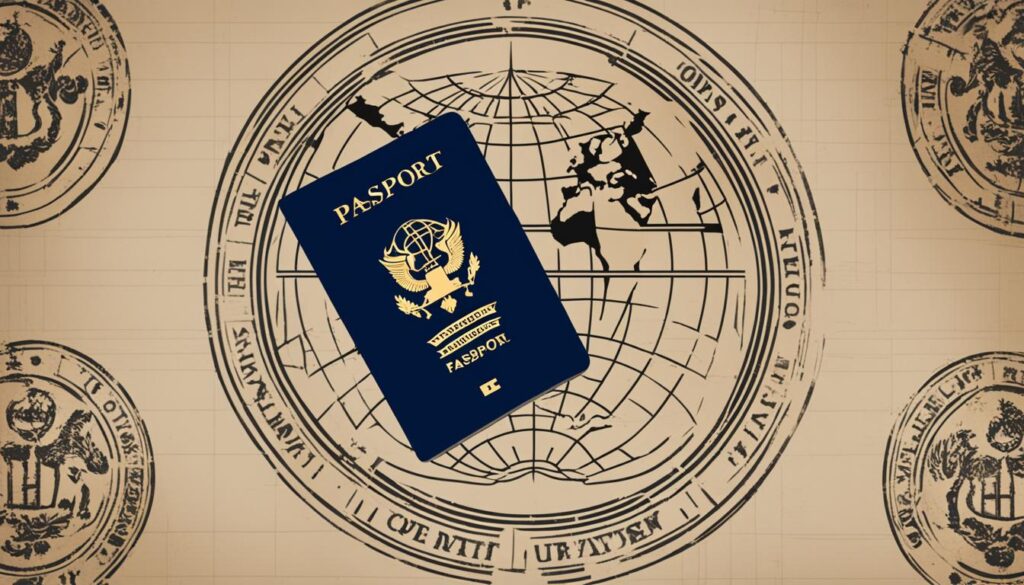Secure Your Trip with Travel Medical Insurance Today.

Planning a trip? Don’t forget to prioritize your health and safety by securing travel medical insurance. Whether you’re embarking on a domestic getaway or an adventurous international excursion, medical coverage while traveling is crucial. Don’t leave yourself vulnerable to exorbitant medical bills or unexpected emergencies. With travel medical insurance, you can have peace of mind knowing that you’re protected.
Travel medical insurance provides coverage for a range of medical expenses incurred while traveling. From hospital stays to doctor’s visits, and even emergency medical evacuation, this insurance ensures that you have access to necessary medical care without the burden of financial strain. If your domestic health insurance doesn’t cover injuries or illnesses sustained abroad, travel medical insurance is a must-have.
Key Takeaways:
- Travel medical insurance is essential for protecting yourself against high healthcare costs while traveling.
- It can be purchased as part of a comprehensive travel insurance plan or as stand-alone coverage.
- Coverage includes medical expenses, hospital stays, doctor’s visits, and emergency medical evacuation.
- Travel medical insurance is especially useful for international travelers and those whose domestic health insurance doesn’t provide coverage abroad.
- Purchasing travel medical insurance is easy; compare policies, understand coverage, and choose the plan that suits your needs.
What Does Travel Medical Insurance Cover?
Travel medical insurance provides comprehensive coverage for various medical expenses that may arise during your trip. Whether you are traveling domestically or abroad, having travel medical insurance can give you peace of mind knowing that you are financially protected in case of a medical emergency.
One of the main benefits of travel medical insurance is coverage for medical bills. This includes expenses for hospital stays, doctor’s visits, prescription medications, and emergency medical treatments. In the event of a serious illness or injury, travel medical insurance can also cover the cost of emergency medical evacuation, ensuring that you receive the necessary care in the closest suitable medical facility.
Additionally, travel medical insurance often includes benefits such as accidental death and dismemberment coverage, which provides financial compensation in the event of a tragic accident. It can also cover repatriation of remains, ensuring that your body is returned to your home country in case of death during your trip. Some plans may even offer coverage for emergency dental expenses and lost luggage, as well as 24-hour assistance services to help you navigate any unforeseen circumstances.
Travel Medical Insurance: Peace of Mind for Your Health
With travel medical insurance, you can travel with confidence, knowing that you have the necessary coverage to protect your health and finances. Before purchasing a policy, it is important to carefully read the terms and conditions, as well as the fine print, to understand the specific coverage, limitations, and exclusions of each plan. By choosing the right travel medical insurance, you can enjoy your trip worry-free, knowing that you are prepared for any medical emergencies that may arise along the way.

Types of Travel Health Insurance Plans
When it comes to travel health insurance, there are various types of plans available to suit different travel needs. The most common type is travel medical insurance, which provides coverage for medical expenses incurred while traveling abroad or domestically. This type of insurance is ideal for international vacationers, relatives visiting from overseas, international business travelers, students studying abroad, and individuals going on cruises or guided tours.
Another type of travel health insurance is temporary health insurance for non-U.S. residents when traveling outside of their home country. This coverage is designed to provide medical protection during the duration of their trip. Additionally, there are plans tailored to fit the needs of missionaries and mission groups, as well as plans specifically for senior travelers.
When choosing a travel health insurance plan, it’s essential to consider the specific coverage and benefits offered. Different plans may have varying limits and exclusions, so it’s crucial to select a plan that suits your specific travel needs and provides adequate coverage for your destination and activities.
Travel Insurance vs. Travel Medical Insurance
When it comes to protecting yourself while traveling, it’s important to understand the differences between travel insurance and travel medical insurance. While both types of coverage provide valuable benefits, they serve different purposes and offer varying levels of protection.
Travel insurance is a comprehensive package that not only includes medical coverage but also provides protection for trip cancellation, trip interruption and delay, lost luggage, and 24-hour assistance services. It offers a wide range of benefits that can give you peace of mind throughout your journey. Whether you need to cancel your trip due to unforeseen circumstances or need assistance with lost or delayed baggage, travel insurance has you covered.
On the other hand, travel medical insurance is specifically designed to provide coverage for medical expenses incurred while traveling. It focuses solely on providing medical coverage in case of emergencies, including hospital stays, doctor’s visits, and emergency medical evacuation. It is especially valuable if your domestic health insurance does not cover injuries and illnesses sustained abroad. Travel medical insurance ensures that you have access to the medical care you need, no matter where you are.
Understanding Your Needs
The choice between travel insurance and travel medical insurance ultimately depends on your specific needs and preferences. If you are primarily concerned about protecting your trip investment and having coverage for non-medical issues such as trip cancellation or lost luggage, travel insurance is the right choice for you. However, if your main priority is securing medical coverage while traveling, then travel medical insurance is the ideal option. It provides peace of mind and financial protection in case of unexpected medical emergencies.
Before making a decision, carefully assess your travel plans and consider the potential risks and expenses involved. Evaluate whether you need comprehensive coverage or if medical coverage alone will suffice. It’s also important to compare different policies, read the fine print, and understand the coverage and limitations of each plan. By doing so, you can select the insurance option that best meets your needs and ensures a worry-free journey.
How Much Does Travel Medical Insurance Cost?
When planning a trip, it’s important to factor in the cost of travel medical insurance to ensure you have proper coverage while traveling. The cost of travel medical insurance can vary depending on several factors. If you purchase travel medical insurance as part of a comprehensive travel insurance package, you can expect to pay between 5% and 6% of your total trip cost for coverage. However, many insurance companies now offer medical-only packages specifically designed for areas that require medical insurance. These packages can cost as low as $9 for a trip valued at $3,000.
The cost of travel medical insurance is influenced by various factors, including your age, destination, duration of the trip, deductible and maximum limit, and any additional optional coverage you choose. For example, coverage for older travelers may be higher due to increased health risks, while coverage for longer trips or riskier destinations may also come at a higher cost. It’s important to carefully consider these factors and compare different policies to find the one that offers the coverage you need at a price that fits your budget.
Remember that while the cost of travel medical insurance is an important consideration, it’s equally important to ensure you have adequate coverage for any medical emergencies that may arise during your trip. Medical expenses can quickly add up, especially if emergency medical evacuation is required or if your domestic health insurance does not cover injuries and illnesses sustained abroad. By investing in travel medical insurance, you can have peace of mind knowing that you’re protected against these potential financial burdens.
Different Types of Travel Medical Insurance Plans
When choosing a travel medical insurance plan, it’s important to understand the different types of coverage available. Travel medical insurance plans can be categorized into primary coverage and secondary coverage, as well as single-trip and multi-trip plans.
Primary Coverage vs. Secondary Coverage
Primary coverage means that you can submit a claim directly to your travel medical insurance company without first submitting to any other insurer. This type of coverage offers a streamlined claims process and quicker reimbursement for medical expenses. On the other hand, secondary coverage requires you to first submit a claim to your primary insurance provider before submitting to the travel insurance provider. This can result in a longer claims process and may involve coordination between multiple insurers.
Single-Trip vs. Multi-Trip Plans
Single-trip travel medical insurance plans provide coverage for one specific trip. These plans are ideal if you only travel occasionally or have a specific trip coming up. Multi-trip plans, on the other hand, offer coverage for multiple trips within a specified period, typically one year. These plans are suitable for frequent travelers who take multiple trips throughout the year. Multi-trip plans can offer cost savings compared to purchasing separate insurance for each trip.
When choosing between primary and secondary coverage, consider your existing insurance coverage and the ease of filing claims. If you travel infrequently, a single-trip plan may be sufficient, while frequent travelers may benefit from the convenience and cost savings of a multi-trip plan.

How to Purchase Travel Medical Insurance
When planning your next trip, it’s crucial to secure travel medical insurance to safeguard your health and finances. To purchase travel medical insurance, you have a couple of options.
The first option is to use insurance comparison sites that allow you to compare different policies from various providers. These sites enable you to easily assess the coverage, cost, and benefits of each policy, ensuring you find the one that best suits your needs.
If you prefer a more direct approach, you can contact insurance providers directly. They will be able to guide you through the process, answer any questions you may have, and help you choose the right policy.
Regardless of the method you choose, it’s important to carefully review the policy details before making a decision. Pay close attention to the type of coverage (primary or secondary), the duration of the policy (single-trip or multi-trip), and any additional optional coverage you may need.
Don’t let your health and finances be at risk while traveling. Take the necessary steps to purchase travel medical insurance and ensure peace of mind during your international adventures.
FAQ
Why is travel medical insurance important?
Travel medical insurance is essential to protect against the high cost of medical care abroad. It covers medical expenses incurred while traveling, including hospital stays, doctor’s visits, and emergency medical evacuation. It is especially useful if your domestic health insurance does not cover injuries and illnesses sustained abroad.
What does travel medical insurance cover?
Travel medical insurance provides coverage for medical expenses incurred during your trip, including hospital stays, doctor’s visits, and emergency medical evacuation. It can also include benefits for emergency dental expenses, lost luggage, and 24-hour assistance services.
What are the different types of travel health insurance plans?
The most common type is travel medical insurance, which provides coverage for medical expenses incurred while traveling abroad or domestically. There are also plans tailored to fit the needs of missionaries, mission groups, senior travelers, and temporary health insurance for non-U.S. residents when traveling outside of their home country.
What is the difference between travel insurance and travel medical insurance?
Travel insurance offers a more comprehensive package of benefits, including medical coverage, trip cancellation, trip interruption and delay, lost luggage, and 24-hour assistance services. Travel medical insurance focuses solely on providing medical coverage in case of emergencies.
How much does travel medical insurance cost?
The cost of travel medical insurance can vary depending on factors such as age, destination, duration of the trip, deductible and maximum limit, and additional optional coverage. When purchasing travel medical insurance as part of a travel insurance package, you can expect to pay between 5% and 6% of your total trip cost in coverage.
What are the different types of travel medical insurance plans?
Travel medical insurance plans can be categorized into primary coverage and secondary coverage, as well as single-trip and multi-trip plans. Primary coverage means you can submit a claim to your travel medical insurance company without submitting to any other insurer first. Secondary coverage requires you to submit a claim to your primary insurance provider before submitting to the travel insurance provider. Single-trip plans cover you for one specific trip, while multi-trip plans cover you for multiple trips within a specified period.
How can I purchase travel medical insurance?
You can search for medical travel policies on insurance comparison sites or contact insurance providers directly. It is important to compare different policies to find the one that best suits your needs and offers the coverage you require. When purchasing travel medical insurance, consider factors such as the type of coverage (primary or secondary), the duration of the policy (single-trip or multi-trip), and any additional optional coverage you may need.



